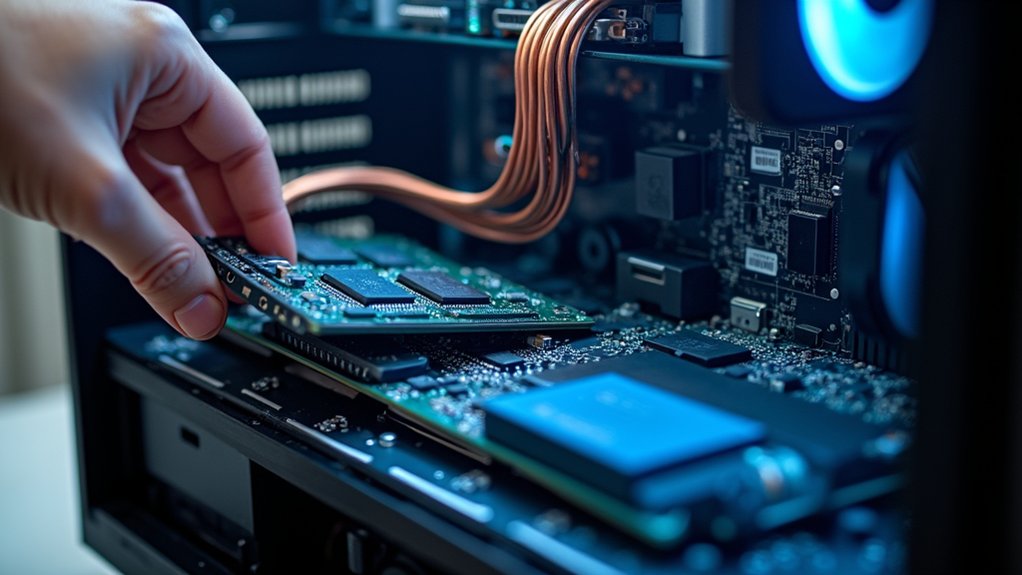
Best video cards and PC specs for 4K gaming
Keen to unlock true 4K gaming performance? Discover which video cards and PC specs deliver stunning visuals—your ultimate setup awaits just ahead.
When you dive into what truly makes a computer system tick, it’s all about the hardware. The hardware, including the processor, memory, and storage, is crucial for managing every task you assign to your system. Without these vital components working in harmony, your software simply can’t perform as designed. But the importance of hardware goes beyond just basic operation; it significantly impacts performance, security, and even the potential for future upgrades. So, what sets essential hardware apart? Understanding the role of hardware in a computer system can empower users to make informed decisions about their technology needs.

Hardware is the backbone of any computer system, consisting of the physical components that you can see and touch. These include the monitor, keyboard, and the intricate internal circuit boards.
Whenever you interact with a computer, it’s the hardware that enables you to input data, view results, and complete tasks seamlessly. Imagine trying to run your favorite software without a computer’s hardware—it simply wouldn’t be possible.
Hardware serves as the essential platform for software to operate, making it a vital element of any computer system. If you’re interested in technology, apps, or smartphones, understanding the role of hardware is crucial.
When diving into the world of technology, understanding the core components of computer hardware is essential.
At the center of any computer system is the central processing unit (CPU), which plays a crucial role in executing instructions and performing calculations. Alongside the CPU, memory components like RAM are vital, as they temporarily store data for quick access.
Storage devices, such as hard drives, are responsible for keeping your essential files and data safe. The motherboard acts as the backbone, connecting all these components together.
Lastly, input/output devices—keyboards, monitors, and mice—allow you to interact seamlessly with your computer. By grasping these core hardware components, you gain a deeper appreciation of how technology powers our daily digital experiences.
Discover how your computer’s hardware impacts system performance, whether you’re surfing the internet or editing videos.
The performance speed is largely dependent on key components like the processor, RAM, and storage type. If your hardware is outdated or underpowered, you might experience lag and slowdowns.
To boost system performance, consider upgrading components such as memory or switching to a solid-state drive. These enhancements can make your computer noticeably faster and more responsive, transforming your tech experience.
Stay tuned for more insights on technology, apps, and software to keep your system in top shape.
In the world of technology, your computer’s hardware plays a crucial role in how effectively your software functions. Imagine trying to run a cutting-edge app on outdated hardware—it just won’t cut it!
If your processor, memory, or storage isn’t up to par, you might experience software crashes, lag, or even apps that refuse to load. That’s why understanding the relationship between hardware and software is so important.
Software developers create programs with minimum hardware requirements, ensuring that only the right components can unlock the full potential of an app.
Unlock the full potential of your computer with strategic hardware upgrades. By investing in more memory, faster storage drives, or a robust processor, you can significantly enhance your system’s performance and longevity.
These computer hardware upgrades not only boost speed and reliability but also allow you to run newer applications seamlessly. Whether you’re handling larger files or multitasking, these computer hardware upgrades ensure your system remains relevant and responsive as your tech needs evolve.
Don’t let your computer fall behind—explore the benefits of computer hardware upgrades today!
Upgrading your system’s hardware can significantly enhance performance and extend its lifespan. However, it’s crucial to consider how these hardware components impact your computer’s security.
Malicious actors often exploit vulnerabilities in hardware, such as outdated firmware or unsecured ports. To protect your data and ensure system integrity, regularly update your firmware, disable unused physical ports, and ensure your hardware supports encryption.
In an ever-evolving world of technology, computer hardware is constantly advancing in speed, efficiency, and capability.
Key trends such as quantum computing, AI-optimized chips, and advanced energy-efficient processors are set to redefine the future of technology.
These innovations will lead to smaller, more powerful components, paving the way for smarter devices.
Staying informed about computer hardware trends will help you leverage the latest advancements to enhance performance, security, and productivity.
As you explore the world of technology, you’ll quickly realize that hardware is the backbone of any computer system. Hardware isn’t just about owning the latest gadgets; it’s about ensuring your device runs smoothly, securely, and efficiently. Understanding the importance of hardware will help you make informed decisions when upgrading or maintaining your computer system.
As technology evolves, staying updated on hardware trends gives you a competitive edge, ensuring your computer system remains reliable and ready for any tasks you need to tackle. Remember, hardware is essential in a computer system, and by mastering its role, you ensure your machine is always at its best.

Keen to unlock true 4K gaming performance? Discover which video cards and PC specs deliver stunning visuals—your ultimate setup awaits just ahead.

Before buying a new video card, discover the crucial steps to ensure compatibility with your motherboard—one mistake could cost you.

On the fence about upgrading your gaming laptop's graphics card? Discover what's truly possible before you make your next move.

Considering a hardware upgrade? Check out which PC brands make swapping components a breeze—and discover the standout choice you might not expect.

Learn how turning off hardware acceleration could solve your gaming glitches—discover if this simple fix is what your setup needs next.

Know if your favorite games could be damaging your PC hardware—discover three crucial tips before your next gaming session surprises you.